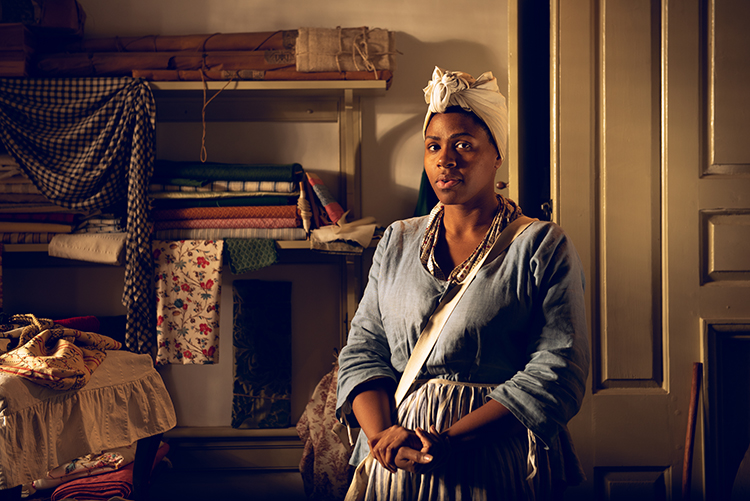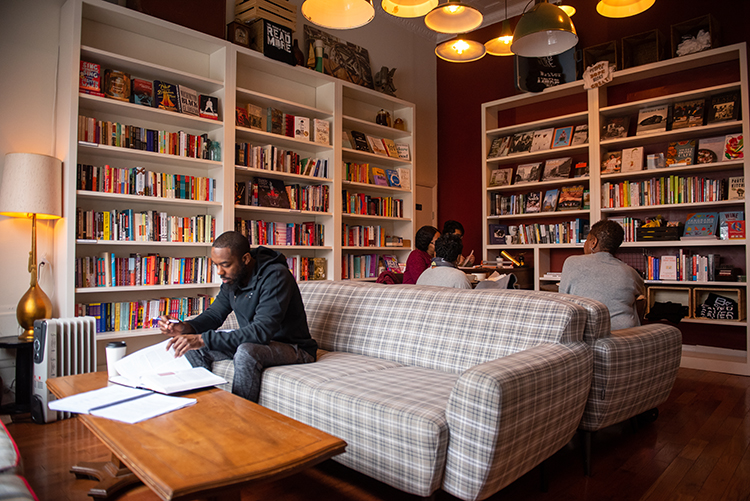By Constance Garcio-Barrio
By the time the Continental Army and its French allies crushed British forces at Yorktown, Virginia, in October 1781, enslaved Black women in Philadelphia had long begged Jesus to make them as free as their white neighbors. In Old City these days, you can “meet” two Black women who likely said such prayers—and had them answered.
Phillis
“Add urine from your chamber pot to wash water to help remove stains, ma’am,” Phillis, the Black washerwoman, portrayed by actress Tasha Holmes, at the Betsy Ross House, 239 Arch Street, tells a visitor. “Mix lemon juice with fuller’s earth [a kind of clay] to lighten dark spots on linen,” she says, in another 1700s washing tip.
It’s not known if Betsy Ross (1752-1836), the iconic flag maker and self-employed upholsterer, hired Phillis to do her laundry, but Phillis’ age, occupation, and presence in Old City suggest that possibility. Born into slavery on October 29, 1747, Phillis belonged to John Jones, a Quaker cordwainer or shoemaker. “We dove into Jones’ will in the Philadelphia Register of Wills to learn all we could about Phillis,” says Kimberly Staub, a historian at the Betsy Ross House who helped to develop Phillis’ storyline. “Phillis allows us to include the African American experience in 18th century Philadelphia. Jones’ will stipulates that Phillis be educated and manumitted after his death.” Though Jones died in 1761, Phillis didn’t become free until 1768, a year when most Black Philadelphians remained enslaved. Phillis—it’s not known if she took a surname—was free when she would have worked for Betsy Ross.
Holmes, 30, speaks of “staying in the Phillis box” when she talks with visitors in the museum’s cellar. “We believe that Phillis had an older brother, Cato, born in 1745, and a younger brother, James, born in 1754, but we’re not completely sure, and we don’t know if she was married, or how she might have gotten along with Betsy Ross. I stick to what’s known,” says Holmes, who stays in character. She shows visitors the kind of buckets Phillis would have used to haul water from a well, washboards for scrubbing clothes, heavy metal irons, and lye soap, possibly made by Benjamin Franklin’s sister in Boston and shipped south.
Though Holmes never strays from “the Phillis box,” she can weave facts suggestively. “We don’t know if Phillis attended the school run by Quaker abolitionist Anthony Benezet (1713-1784). However, I tell visitors that John Jones and Benezet were acquainted, and that the dates fit.”
Holmes, who dons her costume at a different site and then walks to the Betsy Ross House, channels Phillis along the way. “I imagine the horses and carriages and people in colonial dress,” says Holmes, who majored in communications at Thiel College, Greenville, Pennsylvania, and took classes at the Walnut Street Theatre. Though she’s researched the lives of Blacks in colonial Philadelphia, she grapples with unknowns. “I ask myself how bold Phillis would be in answering questions. How confident?” says Holmes, who’d like to have movies roles. “I want visitors to understand the drudgery Phillis endured, that she was a Black woman doing bottom-of-the-barrel work, trying to live as best she could.”
Meet Phillis on weekends in the cellar of the Betsy Ross House, 239 Arch Street, through the end of March. For more information call (215) 686-1252 or visit http://historicphiladelphia.org/betsy-ross-house.
Oney Judge
Just blocks away, at 600 Market Street, stands an open-air exhibition, “The President’s House: Freedom and Slavery in the Making of a New Nation,” where Washington and his family lived during his presidency. There, visitors can see Oney—or Ona—Judge (c. 1773-1858), one of nine enslaved Blacks Washington brought from Mt. Vernon, his 500-acre Virginia estate, to the “big house on Market Street.”
Judge, a “mulatto girl, much freckled …with bushy black hair,” was First Lady Martha Washington’s personal maid. For Judge, Philadelphia—the nation’s capital from 1790-1800, with upwards of 2,000 free Blacks—must have held more excitement than Mt. Vernon with its 300 slaves. From Philadelphia’s pepper-pot women, who sold a spicy soup of tripe and ox feet, to its Black cobblers, caterers, carpenters, teachers and teamsters, the City of Brotherly Love brimmed with possibilities.
In addition to ripe opportunities for Blacks, Judge caught glimpses of the underside of the highfalutin Washingtons and the monied guests they entertained. “Card-playing and wine-drinking were the business at [Washington’s] parties,” Judge told journalists writing for abolitionist newspapers in the 1840s.
Judge’s free Black friends might have told her that the Washingtons were flouting Pennsylvania’s 1780 Gradual Abolition Act, which said that slaves who lived in the state for more than six months became legal residents and consequently free. To prevent the loss of their unpaid help, the First Family shuttled slaves across state lines just short of the six-month deadline to circumvent the law. After all, the Washingtons relied on slaves not only to scrub floors but also to cook and serve sumptuous meals to impress their guests. (Blacks also enhanced the President’s image in another way. An entry in one of Washington’s account books shows that he bought 9 teeth from “Negroes” for 122 shillings for his dentures.)
Judge slipped away from Washington’s house on May 21, 1796. Years later, she told a reporter: “Whilst they were packing up to go to Virginia, I was packing to go, I didn’t know where; for I knew that if I went back to Virginia, I should never get my liberty. I had friends among the colored people of Philadelphia, had my things carried there beforehand, and left Washington’s house while they were eating dinner.” John Bolles, a sympathetic ship’s captain took Judge to Portsmouth, New Hampshire. “I never told his name till after he died . . . lest they punish him …,” Judge reportedly said.
Incensed, the Washingtons offered a reward for apprehending Judge, and twice tried to have her captured quietly. If the matter had become too public, it could have tarnished Washington’s reputation. Warned in time, Judge eluded would-be kidnappers. She married, had three children, and learned to read. However, widowed early, Judge lived in poverty. Asked if she regretted escaping, she said, “No, I am free, and have…been made a child of God by that means.” Judge died in 1848. Her words, published in abolitionist newspapers, helped fight slavery.






